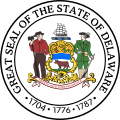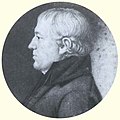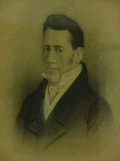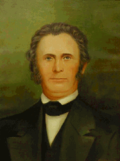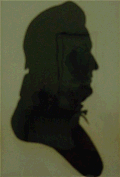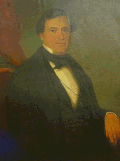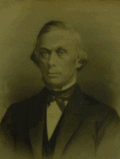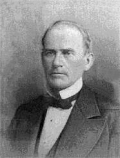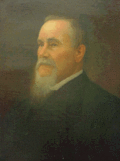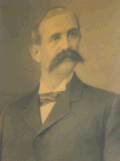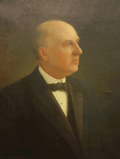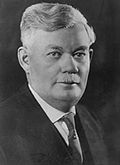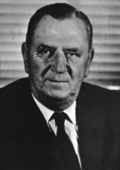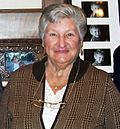Top Qs
Timeline
Chat
Perspective
List of governors of Delaware
From Wikipedia, the free encyclopedia
Remove ads
The governor of Delaware (known as the president of Delaware from 1776 to 1792) is the head of government of Delaware and the commander-in-chief of the state's military forces. The governor has a duty to enforce state laws, and the power to either approve or veto bills passed by the Delaware Legislature, to convene the legislature,[2] and to grant pardons, except in cases of impeachment, and only with the recommendation of the Board of Pardons.[3]
There have been 71 people who have served as governor, over 74 distinct terms. Three (Joseph Haslet, Charles Polk Jr. and Elbert N. Carvel) served non-consecutive terms. Additionally, Henry Molleston was elected, but died before he could take office. Only four governors have been elected to two consecutive terms, with the longest-serving being Ruth Ann Minner, who was elected twice after succeeding to the office, serving a total of just over eight years. The shortest term is that of Bethany Hall-Long, who served 15 days following her predecessor's resignation; Dale E. Wolf served 18 days and David P. Buckson served 19 days under similar circumstances. The current governor is Democrat Matt Meyer, who took office on January 21, 2025.
Remove ads
Governors
Summarize
Perspective
Before 1776, Delaware was a colony of the Kingdom of Great Britain, administered by colonial governors in Pennsylvania as the "Lower Counties on Delaware".
In 1776, soon after Delaware and the other Thirteen Colonies declared independence from Britain, the state adopted its first state constitution. It created the office of President of Delaware, a chief executive to be chosen by the legislature to serve a term of three years, who would be ineligible to be president again until three years had passed after leaving office.[4]
The office of President was renamed Governor by the constitution of 1792,[5] which set the commencement date of the term to the third Tuesday in the January following an election, and limited governors to serving only three out of any six years.[6] The term was lengthened to four years by the 1831 constitution, but governors were limited to a single term.[7] The current constitution of 1897 allows governors to serve two terms.[8]
The 1776 constitution stated that if the presidency were vacant, the speaker of the legislative council would be a vice-president.[9] The 1792 constitution has the speaker of the senate exercising the office when it is vacant, and the 1897 constitution created the office of lieutenant governor,[10] upon whom the office devolves in case of vacancy.[11] The offices of governor and lieutenant governor are elected at the same time but not on the same ticket.
Remove ads
Timeline
| Timeline of Delaware governors |
 |
See also
Notes
- Lieutenant governors represented the same party as their governor unless noted.
- Most sources do not specify the day McKinly was captured; at least one specifies that McKinly and the city of Wilmington were captured the day after the Battle of Brandywine, which was on September 11, 1777.[17]
- Speaker of the Assembly McKean acted as chief executive until the return of speaker of the Legislative Council Read from the Continental Congress in Philadelphia, who then served as vice-president for the remainder of the term.[23]
- Dickinson was elected President of Pennsylvania and took office November 7, 1782, holding both presidencies simultaneously. Criticism of this caused him to turn administration of the state over to Speaker of the Legislative Council Cook, but Dickinson did not formally resign until January 13, 1783.[14][33]
- Bassett resigned, having been confirmed to the United States Third Circuit Court.[61]
- Due to the death of Governor-elect Molleston, there was some question as to who should take office when Clark's term ended. To minimize any confusion, Clark resigned a few days ahead of schedule, and the newly elected state senate chose a speaker, John Stout, who would act as governor for one year of Molleston's term before a special election was held for the remaining two years.[92][93]
- Represented the Democratic Party
- Boggs resigned, having been elected to the United States Senate.[254]
- Represented the Republican Party
- Castle resigned, having been elected to the United States House of Representatives.[272]
- Carper resigned, having been elected to the United States Senate.[278]
- Carney resigned, having been elected mayor of Wilmington.
- Meyer's term expires on January 16, 2029.
Remove ads
References
External links
Wikiwand - on
Seamless Wikipedia browsing. On steroids.
Remove ads

